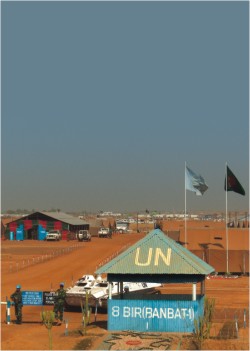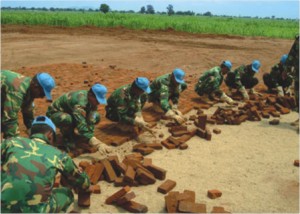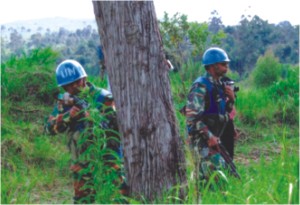
Inside
|
Welcome to South Sudan Nadeem Qadir journeys to the deserts of north-central Africa to catch a first-hand glimpse of our peace-keeping troops in action
Welcome to South Sudan! Forget glittering North Sudan! As one gets out of the aircraft at Juba International Airport a sudden heat wave greets the guest to this country ravaged by 22 years of civil war. Juba is the capital of South Sudan, which has remained basically untouched by civilization because strife in the region started soon after independence in 1956, killing at least 1.5 million people. Sudan, 18 times the size of Bangladesh and a former British and Egyptian Colony, became independent in 1956, and the strife broke out soon after. The last one was over imposition of Sharia Law, which the Christian dominated south rejected. A Comprehensive Peace Treaty (CPA) was signed in 2005, and the blue-berets poured in from 2006, targeting a referendum in 2011 under UN supervision. Widely known for being divided into north and south due to religious disagreements, it appeared to me that the cause was more economic disparity and politics. The South alleged that it was neglected and repressed, while the North, where the capital Khartoum is located, ignored. Sheikh Suleiman, Imam of the Juba University mosque, says: "Christianity and Islam do not have any problem to stay together. Sudan is a country where a single family has both Muslim and Christian faiths." But he warns that: "There are western, and some other, quarters in neighbouring countries who do not want the people of Sudan to live in peace. The war depends on them. We have oil, water, land … that is why they want war." "People are moving around with weapons and unless the government takes steps to seize those, the tension will not go," he told this correspondent in his mosque. The Bishop of Juba, Joseph Marona, partly echoed the Imam, saying: "Religion was used to implement a design (and) for politics." "We do not have any problem (with) who is a Muslim and who is a Christian. This is not religious war, but religion was misused," said the powerful bishop who has a major following in the Christian-dominated South Sudan. He said: "Now we are at peace, as the reconciliation process is underway under the Comprehensive Peace Agreement signed two years ago." "Sudan's root cause of the problems is politics" he said, adding that the "CPA is a way to peace, and fighting means going back to the jungle." The Juba Post, a weekly tabloid newspaper, reflects the worries of some Sudanese. It reported from Malakal area in its latest issue: "Tension over SSDF redeployment," "Chiefs sick of unpunished adultery by soldiers," in a report from a still high-risk security area saying that a Joint Integrated Unit soldier was involved in adultery. Also it reports that another faction -- the "Lord's Resistance Army (LRA)" -- is a threat to Southern Sudan security. Bangladeshi peacekeepers cleared out massive jungles and mine-fields to start their job under the United Nations Mission in Sudan (UNMIS). "We had to cut the jungles and develop the land to make it habitable," said Colonel Quadrat Elahi Rahman Shafique, a Bangladeshi officer commanding Sector-1. The ever-smiling colonel with wit added that, with the arrival of UNMIS, life and civilization were slowly coming to South Sudan which would decide, through a referendum in 2011, whether to remain with North Sudan, which is centered in Khartoum, or become a separate entity.
The unity, or separation into two states of Africa's largest country, is still sketchy, and most prefer to leave it to time for the final outcome. Before moving on, let me introduce you to Juba city. It has, besides the airport, some government buildings and some dilapidated structures damaged by the war. Some homes are being repaired, and where government leaders stay there is a little touch of civilization. With only five kilometers of proper roads, dust is the order of the day. Those with dust allergy need not worry, as this dust has no immediate effect due to lack of humidity, and, thus, there is no sweating. Dust storms hit without notice. The weather is like a desert's, with extreme heat during the day and a mild cool breeze flowing after sunset. I was looking for a shop to buy something indigenous. The craftsmen have almost vanished and, thus, the only shop is selling goods brought in from Uganda or Kenya. Luckily, our team leader, Lieutenant Colonel Kibria, picked a local wood-made giraffe and laughed out loud, saying: "Look this has the face of a monkey." That was it! I grabbed it as my most treasured souvenir from Sudan. The largest market of Juba is made of bamboo and tin, or, at most, straw mats. Filled with Chinese clothes and shoes, along with Arabic and Indian songs and music rather than their own. It was with a lot of effort that I could find some local cassettes which I am enjoying very much. What crossed my mind was that the clothes on sale were not really fit for Sudanese weather, but that is all there is. You take what you get. Why not set up a Bangabazar here? My blue helmet friends agreed that a Bangabazar would do booming business. All that one has to keep in mind is that, like in any other African country, Sudanese people like colourful dress. If you are planning a walk around in Juba, watch out with your camera. Even with a pass from the Ministry of Information, one might get arrested or shot for taking a picture, as some do not like aliens going away with such "rare pictures." It was not an easy task for me, as I was there to shoot a documentary. Please wear full shirts and pants, along with socks, to save yourself from the sun and the deadly malaria-carrying mosquitoes. Coming to the Bangladeshi peacekeepers, they made us proud again, like they did in other missions. They have been able to accomplish their first task -- to build a relationship of confidence and goodwill with all sides in the vast region. From generals to ministers to the man on the street, Bangladesh is a name they respect. "You soldiers put Bangladesh on the map, in the hearts of our people .. they chant Bangladesh, Bangladesh," said Joseph Lasu Gale, the Information and Culture Minister of the Bahr El Jebal State of Southern Sudan.
He described the Bangladeshi general who was the force commander, and the previous and current sector commanders as "wonderful friends." "They respond to our needs with lot of understanding," he said. Cameraman-turned-politician, Gale says: "Bangladeshi troops were the first to rescue us, and distribute much-needed drinking water to homes and hospitals," where cholera or diarrhea appeared to be a regular problem. He explained that the CPA contained all the elements to give Sudan unity, and Sudanese President Bashir was a man who had the ability to listen and, thus, he was hopeful that Sudan would remain one. "This is a new Sudan, a Sudan for development," he quickly added, saying that the South was marginalized due to the war and they were starting from scratch. "We need help to build infrastructure, we need all kinds of investment and help," Gale said, adding that they were ready to sign agreements for investments with huge land on offer. "Nothing has been tapped so far, and nobody has taken anything out of this country ... it is good for new investors," he said. Gale, describing the virginity of his land, explained that all food was organic and no fertilizer was needed for agriculture. Much of what Gale said on investments, and on building a new Southern Sudan, was echoed by Major General Thomas Cerillo Swaka. Swaka is the deputy force commander of the Joint Integrated Unit, combining the once feuding Sudanese Armed Forces (SAF) and the Sudanese People's Liberation Army (SPLA). "We are now in the reconciliation process to put the past behind and begin anew, but it takes time," the tall and confident general told a group of visiting journalists from Bangladesh. "The success of the CPA depends on its implementation by all, specially the North, as already some obstacles have come as some protocols and clauses are yet to be put in place," he warned, but also stressed "war is over. Nobody wants war." Asked to reply only "yes" or "no if Sudan would go back to war, the general said: "I can say no, but it all depends on human actions." Swaka said that the South needed lot of investment to develop its roads and other sectors. Generators are the source of electricity, and no credible answer was available as to why a dam on the White Nile River was not on the cards to solve the crisis. One UN official said that the dam was not on the cards possibly because of earthquake threat in that part of the region. "Our fertile land can be a good place to grow rice, paddy and other foods that the locals will need over the time," said Swaka in his mud and straw-built, round-shaped tukul, guarded by armed troops. The Juba Post reports that the Country's Jonglei State in South Sudan has an abundance of oil. It has an estimated 1.2 billion barrels of oil, wrote the tabloid, quoting Phillip Ward, Chief Operations Officer of White Nile Company. The country already produces 150,000 barrels of oil daily. With such resources and fertile land many believe it could also be a target for Bangladeshi businessmen and workers. Sudan is more than eight times the size of Bangladesh, and has a population of about 35 million, simply 100 million less than Bangladesh. Bangladeshi peacekeepers, who live and work in difficult conditions, say that they are pledge bound to ensure a peaceful referendum under the United Nations in 2011, despite some lingering security issues. Most feel that if peace was restored permanently, South Sudan could turn out to be a gold-mine for investment. General Swaka, too, had words of praise for the UNMIS Bangladesh contingent, saying: "Your men act according to the mandate. They are a well trained (and) organized army. We have very good terms [with Bangladeshi peace keepers] and we are impressed by their performance," Swaka added. Indeed, Bangladeshi blue berets deserve a salute for achieving yet another milestone in their global peace keeping mission. Living in a tent town in such hot weather, where temperatures go up to 50 degrees Celsius, they have also battled the weather to deliver the task given to them. Ask any member of the contingent about the difficulties, the answer is almost the same: "We are trained to face all odds," or "We have to do this for our country." Even two lady doctors, who made history by becoming the first women to work in a field hospital, echoed the others. Lieutenant Colonel Khaleda Parveen is a radiologist, while Captain Shormin Momtaz, a mother of a nine-month-old baby, is a dentist. They admit that the hot weather was unexpected, but call of duty for the nation helped them conquer all odds. Nadeem Qadir is a freelance journalist and a TV anchor. |


